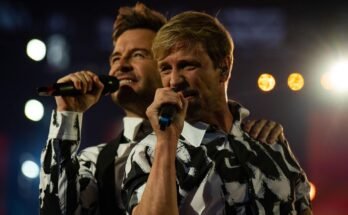LOS ANGELES, CALIFORNIA — January 26, 2014 — The 56th Annual GRAMMY Awards at the Staples Center delivered one of the most emotionally resonant and socially significant performances in the award show’s storied history when music legends Madonna and Queen Latifah joined breakout producer Ryan Lewis and rapper Macklemore for a groundbreaking live performance that captivated both the audience in attendance and millions watching around the world.
This historic moment transcended entertainment, becoming a cultural milestone that celebrated love, equality, and the unifying power of music.
The Performance: A Fusion of Music and Message
The performance centered on the song “Same Love,” a hit single by Macklemore & Ryan Lewis that had already become an anthem for LGBTQ+ rights and marriage equality. The track, featuring singer Mary Lambert, had been lauded for its poignant lyrics that tackled homophobia, discrimination, and the politics of love in the United States. Its appearance at the GRAMMYs wasn’t merely about showcasing a hit song—it was a deliberate, powerful statement at a time when the national conversation about same-sex marriage and civil rights was at a boiling point.
As Macklemore and Ryan Lewis delivered their verses with heartfelt sincerity, Mary Lambert’s soulful chorus set an emotional tone. Then, Queen Latifah—herself a trailblazer in both music and activism—took the stage and introduced an unexpected and unforgettable element to the performance: the officiation of a mass wedding.
Queen Latifah Officiates Onstage Wedding Ceremony
In a GRAMMYs first, Queen Latifah, who had been temporarily deputized by Los Angeles County to perform legal marriages, presided over a live wedding ceremony involving 33 couples of diverse backgrounds. The couples—straight, gay, interracial, and multiethnic—stood together in unity as Queen Latifah pronounced them legally married, symbolizing a shared human experience that transcends gender, race, and orientation.
The atmosphere in the Staples Center was electric with emotion. As Queen Latifah declared the marriages official, the crowd erupted into applause, some in tears, others visibly moved by the magnitude of the moment. This symbolic celebration of love and inclusion stood as a landmark gesture in a country where marriage equality was still a divisive issue at the time.
Enter Madonna: A Queen Joins the Ceremony
As if the moment couldn’t grow more iconic, pop royalty Madonna emerged onstage dressed in a white Ralph Lauren suit and cowboy hat, a subtle nod to themes of Americana and tradition reimagined through a modern, inclusive lens. She performed a stirring rendition of her classic hit “Open Your Heart,” which seamlessly transitioned into a duet with Mary Lambert, blending with the chorus of “Same Love” to amplify the message of unconditional love and acceptance.
Madonna’s appearance was a surprise to many and added a sense of gravitas to the performance. Known for decades as a provocateur and champion of LGBTQ+ rights, her presence underlined the cultural weight of the moment. She delivered her vocals with warmth and conviction, clearly understanding the importance of the occasion beyond entertainment.
Cultural Impact and Public Reception
The performance was widely praised across media platforms for its boldness, emotional impact, and progressive message. Major news outlets like The New York Times, Rolling Stone, and CNN highlighted it as one of the most memorable and culturally significant moments in GRAMMY Awards history.
LGBTQ+ advocacy groups and civil rights organizations applauded the GRAMMYs for using their platform to champion inclusivity and support same-sex marriage, which was still being contested in many states at the time. Social media lit up with hashtags like #SameLove and #GRAMMYsWedding trending worldwide, reflecting the global resonance of the performance.
Critics who were less receptive to the political nature of the display cited discomfort with mixing entertainment and social activism. However, supporters argued that music has always been a powerful vehicle for social change, from civil rights anthems of the 1960s to today’s protest songs.
Legacy of the Performance
In hindsight, the 56th GRAMMY Awards marked a turning point not only in the music industry’s engagement with social issues but also in mainstream American culture. Just a year later, the U.S. Supreme Court would begin hearing arguments that led to the legalization of same-sex marriage nationwide in 2015.
The performance solidified “Same Love” as more than just a song—it became a movement. Queen Latifah’s officiation of a mass wedding on primetime television, Madonna’s vocal support of the LGBTQ+ community, and Ryan Lewis and Macklemore’s willingness to speak on injustice through their platform all demonstrated a rare alignment of artistry and activism.
Moreover, the collaborative nature of the moment—featuring rap, pop, soul, and gospel elements—symbolized the way different musical traditions could come together to amplify a shared human message.
Conclusion: When Music Makes History
The 56th GRAMMY Awards will forever be remembered not just for its winners and red carpet glitz, but for its unflinching embrace of equality and love. The performance by Madonna, Ryan Lewis, Macklemore, Mary Lambert, and Queen Latifah broke new ground for live television, fusing music with a powerful social message that left a lasting impact on viewers and the industry alike.
It was a night when music didn’t just entertain—it united, inspired, and made history.



